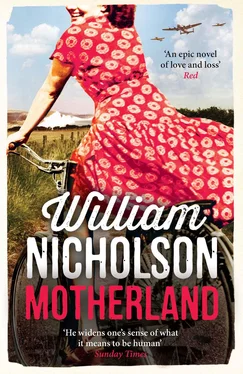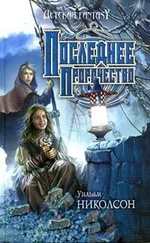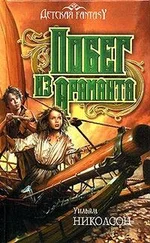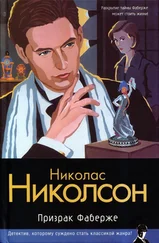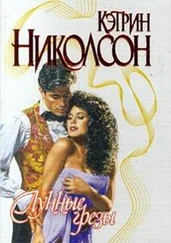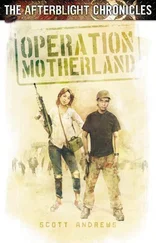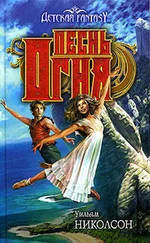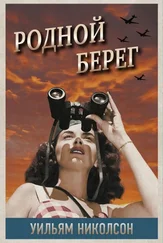‘No battleships,’ says the navy man. ‘Dudley Pound vetoes battleships off the French coast in daylight. Says it’s utter madness.’
‘So what have we got?’
‘Hunt-class destroyers.’
‘Destroyers?’
‘And,’ says the army man, ‘one hell of a lot of Canadians.’
Larry feels he shouldn’t be hearing this. He moves forward just as Rupert Blundell moves back.
‘I was told to pick up a packet for Div HQ,’ he says in a whisper.
Blundell looks round his colleagues.
‘Orders for Div HQ?’ he says to no one in particular.
Bobby Casa Maury, Head of Intelligence, sees Larry by the doorway and frowns. He speaks low to Mountbatten. Mountbatten looks up and recognises Larry.
‘One of ours,’ he says. He returns to the map. ‘What’s the story on air support?’
‘Full pack there,’ says the RAF man. ‘Should be the biggest show of the war.’
‘Excellent,’ says Mountbatten, cheering up. ‘Control the air and the battle’s half won.’
Bobby Casa Maury catches Larry’s eye and waves one hand, palm downwards, fingers flicking forwards, in a gesture that means go away. Larry withdraws.
In the hallway outside a Wren called Joyce Wedderburn sits at a desk with a typewriter and two telephones, guarding entrance to the chief. She gives Larry a friendly smile as he sits himself down on one of the upright chairs that line the long wall.
‘Back to waiting?’ she says. ‘Want a cup of tea?’
‘No, thanks,’ says Larry. ‘Shouldn’t be long.’
He finds himself thinking how much better it would be if there were pictures on the walls. So much of wartime consists of sitting, waiting, staring at blank walls. Why not get all the artists painting, and hang all their pictures on all the walls? Even if you don’t like a picture you can stare at it and see everything that’s wrong with it, which passes the time. All it would take would be for someone like Mountbatten to give the order, and all over the country armies of artists would set to work doing watercolours of sunsets, and army canteens and ministry corridors would take on a new eccentric character. Put a picture on a wall and you cut a window into another world.
From this he falls to thinking of all the paintings he knows which represent actual windows, and the view beyond. Leonardo’s Madonna of the Carnation , which he saw once in Munich, with its view of mountains framed by arched openings. Or Magritte’s strange broken windows, where the fragments of glass carry the same sunset sky as the view beyond, but fractured and displaced. The effect of the frame within the frame is potent, almost magical. What is it about windows? The comfort and safety of the known world set beside the promise and excitement of a world beyond.
‘There you go.’
It’s Rupert Blundell with a big brown envelope. Larry jumps up and takes the packet, pushes it into his satchel.
‘Wish the boys luck from us,’ says Blundell.
5
A sharp rat-a-tat at the bedroom door summons Kitty and Louisa from a deep sleep. Hurriedly they wake, wash, dress. Downstairs the great hall is abuzz with activity. Colonel Jevons is standing in the Oak Room lobby with a sheet of paper on which are lists of names.
‘You’ve just got time for a bite of breakfast,’ he tells Kitty. ‘Have the Brig’s car outside for 0330.’
She follows the stream of half-asleep men clustering round the tea urn in the dining room. At this hour she can’t eat. The others coming and going round her seem to be taking care to make as little noise as possible. Then she realises they’re all wearing soft-soled boots.
Her section leader, Sergeant Sissons, is pacing the yard by the garages, using her torch to direct the troop transport trucks.
‘Got your orders?’
‘All set,’ says Kitty.
She opens the garage doors and feels her way down the side of the Humber to the driver’s door.
‘Early for you, Hum,’ she tells the car. ‘Be a darling and start first time.’
As she reverses out into the yard she sees the lines of soldiers filing into the transport trucks. They move silently, shadows in the deeper shadow of the night. The headquarters building is alive with purposeful activity, but all of it muffled and cloaked in darkness. She drives slowly out of the yard and round the chapel, finding her way to the front porch by the slot of light from the car’s blackout masks.
Jevons comes out and sees that she’s in place. Other cars begin to arrive. She no longer feels in the least sleepy. She hears the throb of truck engines in the yard, the crackle of boots on the gravel, the drone of a plane passing overhead. Not yet dawn, but the world is up and about its work.
A mass of officers now appear from the house. They stand close together, torchlight flickering over papers held open between them. The heavy lorries start rumbling past, away down the drive. Then the doors of the Humber are being opened from the outside and officers are climbing in. Shortly Kitty hears the brigadier’s voice from behind her head.
‘Let’s go,’ he says.
‘Where to, sir?’ says Kitty.
That causes a soft laugh from the officers. So much secrecy, no one has thought to tell the driver.
‘Newhaven,’ says the brigadier. ‘The harbour.’
Kitty eases the Humber down the drive, following behind a long line of troop transports, their tail lights glowing softly in the night. At the junction with the road she takes her turn, waiting as vehicle after vehicle rolls past. A faint gleam is now appearing in the sky to the east. Behind her the voices of the officers murmur, and papers rustle. She hasn’t been told what’s going on, and knows better than to ask, but it doesn’t take a genius to guess.
On the dark winding road now, and making for the coast. The light grows brighter on the horizon. The boys in the back of the truck ahead wave at her and grin. One of the officers behind lights up a cigarette, and the tang of smoke fills the car.
The harbour cranes come into view. The road runs alongside the railway. The column of trucks rolls into the port, and the Humber follows. The great marshalling yard by the quay is full of vehicles and disembarking men. Out on the water, lit now by the dawn, lies an immense fleet of craft of every size. Little boats are buzzing about, carrying men from craft to craft. A crane is hoisting an armoured vehicle onto a deck. The heavy throb of ship’s engines fills the air.
‘This’ll do,’ says the brigadier.
Kitty pulls up and the officers get out. Kitty too gets out, and stands by the car as she’s been taught. No one pays her any attention. The brigadier strides away, trailed by his staff. All round, platoons of men are being marched across the concrete yard to the boarding ramps. They wear helmets and carry guns and kitbags. No one shouts or breaks into song, the way troops on the move usually do. The early morning is filled with a purposeful seriousness.
Kitty waits and watches, and the sun rises. The scale of the operation slowly becomes visible. There are ships at sea all the way from the pier to the horizon. As each craft fills up with men and vehicles, it churns out of the harbour to join the waiting fleet.
A train pulls into the quayside and more streams of men get out. Among them Kitty sees a group moving differently to the rest. Instead of forming up in marching order, they slope along in a disorderly straggle, wearing wool hats in place of tin helmets. She hears one of the other drivers murmur, ‘Commandos.’ For the first time it occurs to her that Ed might be part of the operation.
She leaves her post and goes to one of the muster officers by the ramps.
‘Is 40 Commando going?’ she asks.
‘Can’t say,’ he replies.
Читать дальше
